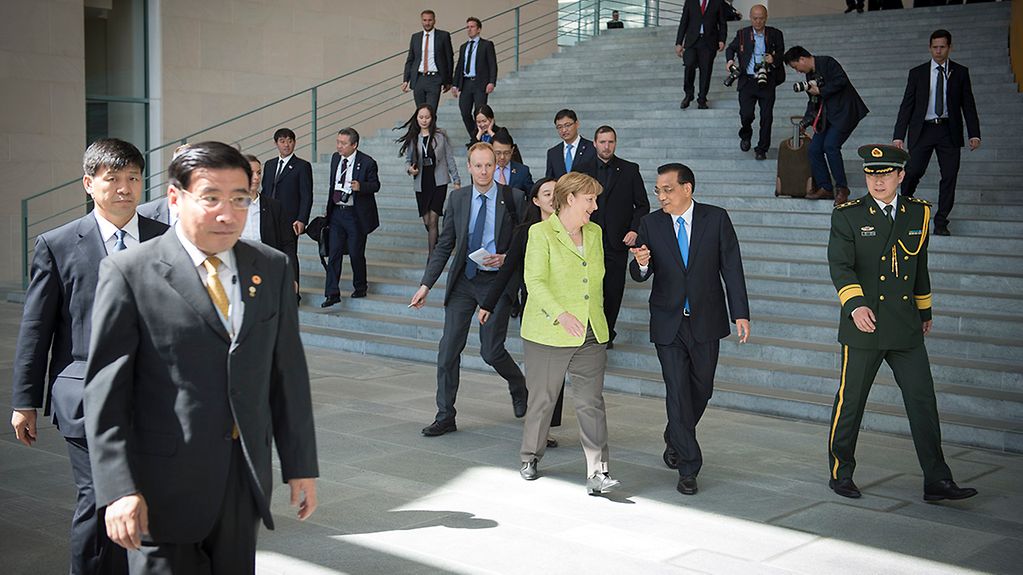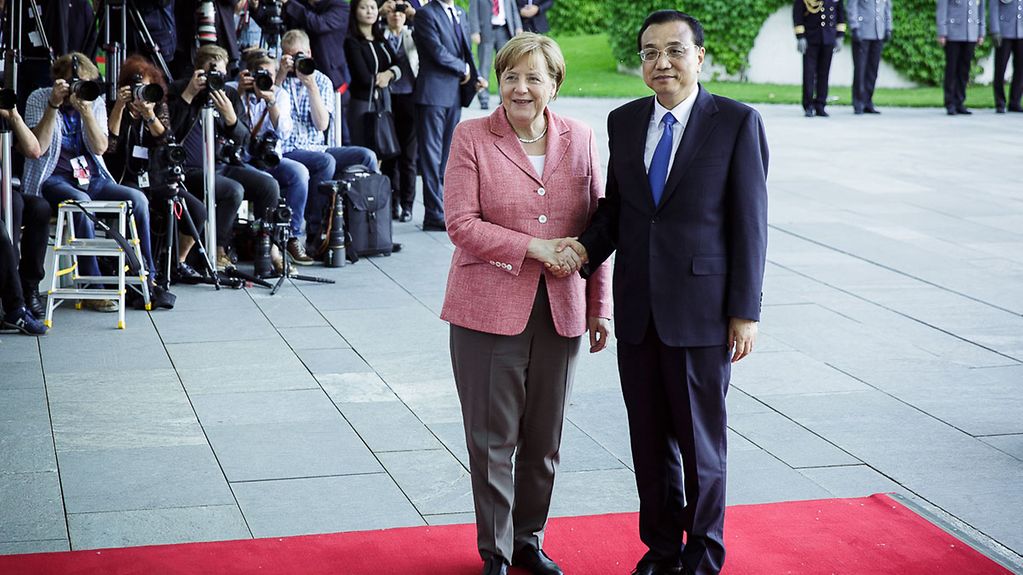China's head of government in Berlin
In times of global uncertainty, Germany and China intend to consolidate their cooperation, reaffirmed Chancellor Angela Merkel following initial talks with her Chinese counterpart Li Keqiang. China’s Prime Minister is on a two-day visit to Germany.
6 min reading time

On the way to a Sino-German Forum meeting
Photo: Bundesregierung/Bergmann
At a joint press conference with Prime Minister Li Keqiang in Berlin, Chancellor Angela Merkel underlined the good and intensive atmosphere in which their talks had been conducted. In the 45 years since diplomatic relations were established between the two countries, she said, China "has become an increasingly important partner and is now also a strategic partner". This applies to the full spectrum of relations; political, economic, "and also cooperation on cultural and societal matters", summed up the Chancellor. She thanked her visitor for the open and intensive talks.
Addressing global problems together
In view of the many and diverse global challenges currently facing us, Angela Merkel stressed the need to accept responsibility and develop the partnership in a wide range of different fields. That means "working together for a rule-based global order". In the year of Germany’s G20 Presidency – following China’s Presidency in 2016 – she is very happy that there is such an intensive exchange of experience with the Chinese leaders.
This applies not least to climate change mitigation. The Chinese Prime Minister expressly reaffirmed his country’s support for the Paris Agreement on climate change. The People’s Republic of China, declared Li Keqiang, will accept its responsibility and forge ahead with climate action worldwide. He also pledged assistance for needy states within the framework of what is termed "South-South cooperation".
Making trading relations fair
The Chancellor reported that the two sides agreed that trading nations like Germany and China must "clearly affirm their support for free trade". With bilateral trade worth 170 billion euros in 2016, China is Germany’s most important trading partner. These are "very impressive figures" and both countries would like to build further on this trend, which is "very positive for both sides". The fact that eleven agreements were signed at their meeting is an indication of the breadth of cooperation.
A total of eleven agreements and declarations of intent were signed regarding cooperation in a wide spectrum of fields including aeronautical engineering, electric mobility, recycling technology and artificial intelligence. Partners on the German side include major players like Airbus, Daimler, Volkswagen and Bosch, as well as medium-sized businesses and research facilities.
We believe in open markets and rule-based global trade, and are convinced that the World Trade Organization (WTO) has a key role to play in this," underscored Angela Merkel. Both countries support WTO rules. The EU, which negotiates on behalf of its member states, is endeavouring to find a solution which does not discriminate against China, but ensures equal treatment for all states in compliance with the rules. An investment protection agreement is to be negotiated as swiftly as possible between the EU and China.
With respect to the opening of markets, the Chancellor made it clear to her visitor that progress is needed here. "We are relying on foreign businesses receiving equal treatment in China." There have been repeated individual difficulties in this regard, which have been discussed, reported Angela Merkel.
Working together to generate more innovation
In the field of electric mobility, Germany and China are pursuing "similar goals". For this reason the framework conditions for German manufacturers in China were discussed. "These must of course be favourable so that we can achieve the goals of electric mobility," said the Chancellor, and reported that she is confident that there is good reason to "trust that favourable solutions can be found".
Together the Chancellor and the Prime Minister attended a meeting of the Sino-German Forum. The motto of the meeting, under the aegis of Federal Research Minister Johanna Wanka and her Chinese counterpart Wan Gang, was "Shaping Innovation Together". Both the Chancellor and the Chinese Prime Minister gave keynote speeches.
For robust civil society
The Chancellor reported that she is happy that new legislation in China has now made it possible to find a solution for the work of political foundations from the Federal Republic of Germany in China. It is encouraging, she said, that all offices of the foundations represented in China have now been able to register successfully in the host country, and expressed her hope that they can now resume their political and cultural education work in conjunction with Chinese civil society.
"We consider it very important that civil society too is strengthened by the presence and the work of various non-governmental organisations." It is good for both countries, she said, if their civil societies can develop as a result of the capacity of "non-governmental organisations to work freely and sensibly". She added, "We are convinced that our political foundations can make an important contribution."
Wide spectrum of issues
The nuclear conflict with North Korea, which, according to Angela Merkel "could jeopardise world peace", was an important foreign-policy issue during her talks with Prime Minister Li Keqiang. They agreed "that the sanctions must remain in place, but we believe a negotiated solution is the way forward." This is "very, very urgent" and Germany has expressed its readiness to contribute, said the Chancellor.
Welcome with military honours

Prime Minister Li Keqiang was in Berlin for talks with the Chancellor
Photo: Bundesregierung/Denzel
On Wednesday afternoon Chancellor Angela Merkel welcomed her Chinese guest, Prime Minister Li Keqiang, with military honours at the Federal Chancellery. This was followed by a first meeting with the Chancellor and several Cabinet ministers, which looked at foreign and economic policy matters.
In the evening Prime Minister Li closed the first day of his visit with dinner with the Chancellor.
The Federal Republic of Germany has maintained diplomatic relations with the People’s Republic of China since 1972. Since then, Germany, along with the other EU member states, has pursued a one-China policy. Today China is Germany’s most important trading partner, ahead of both France and the USA, with trade worth almost 170 billion euros in 2016.
Frequent two-way high-ranking visits
At the meeting of G20 Foreign Ministers in February in Bonn and at the strategic dialogue held in Berlin at the end of April, China’s Foreign Minister Wang Yi was the guest of Federal Minister for Foreign Affairs Sigmar Gabriel. The German Minister, for his part, was in Beijing for talks last week (23 May), focusing on the reform agenda, trade and investment, and electric mobility. But Sigmar Gabriel also broached the issue of human rights.
Federal Minister for Economic Affairs Brigitte Zypries, Federal Minister of Justice Heiko Maas, and Federal Development Minister Gerd Müller have also visited the People’s Republic of China recently for an exchange of views with the respective counterparts.
China’s President Xi Jinping will be coming to Germany to attend the G20 summit in Hamburg in July, where global trade and open access to markets in compliance with the rules of the World Trade Organization (WTO) will play an important part. "China and Europe both advocate an open world trade regime," stressed Sigmar Gabriel last week in Beijing.
Since 2004, Sino-German relations have been defined as a "strategic partnership in global responsibility". In March 2014 this was upgraded to a "comprehensive strategic partnership". Regular government consultations have been held between the two countries since 2011. A total of 60 bilateral dialogue forums are also in place, many of them at top government level. They include a rule-of-law dialogue and a human rights dialogue. They are intended to further consolidate relations between the two countries. During his visit to Beijing, Federal Minister for Foreign Affairs Sigmar Gabriel launched the civil society "People-to-People Dialogue".